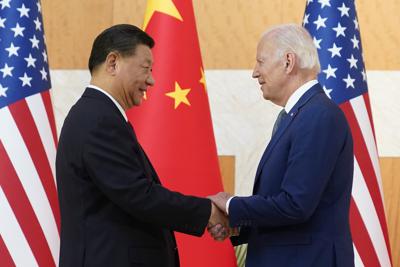Manas Dasgupta
NEW DELHI, Nov 14: After the customary hand-shake and broad smiles at the one-to-one meeting, the United States President Joe Biden on Monday objected to China’s “coercive and increasingly aggressive actions” toward Taiwan and raised human rights concerns about Beijing’s conduct in Xinjiang, Tibet, and Hong Kong.
In his first in-person meeting with his Chinese counterpart Xi Jinping at Bali, Indonesia, Biden told Xi that the U.S would “continue to compete vigorously” with China, but that “competition should not veer into conflict,” the White House said in a statement on the meeting between the two.
The White House said Biden and Xi also agreed that “a nuclear war should never be fought” and can’t be won, “and underscored their opposition to the use or threat of use of nuclear weapons in Ukraine.” That was a reference to Russian officials’ thinly-veiled threats to use atomic weapons as its nearly nine-month invasion of Ukraine has faltered.
While the two presidents clashed over Taiwan, they found areas of common ground during the powers’ first in-person summit in three years, including a joint warning against Russia using nuclear weapons in Ukraine. Xi and Biden both sought to lower the temperature as they met on the resort island of Bali, with the presidents both saying they wanted to prevent high tensions from spilling over into conflict.
Ahead of their first in-person talks since Mr. Biden became President, the two leaders smiled and shook hands warmly in front of their national flags at a luxury hotel on Indonesia’s Bali island. “It’s just great to see you,” Mr. Biden told Mr. Xi, as he put an arm around him, before a meeting that lasted a little over three hours.
In a sign of headway on working together, the White House announced that Secretary of State Antony Blinken would visit China — the most senior US visitor since 2018. Biden and Xi, who is on only his second overseas trip since the pandemic, shook hands and smiled before the two countries’ flags at a hotel in Bali, where the Group of 20 opens a summit on Tuesday.
Tensions have risen sharply over Taiwan, with China in August conducting major military exercises after a visit to the self-governing democracy, which it claims, by US House Speaker Nancy Pelosi. Xi told Biden that Taiwan is the “first red line that must not be crossed in China-US relations,” according to the Chinese foreign ministry statement.
The White House said Biden told Xi he opposed any changes on Taiwan — after the US leader repeatedly indicated that Washington was ready to defend the island militarily. Biden raised US “objections” to China’s “coercive and increasingly aggressive actions toward Taiwan, which undermine peace and stability across the Taiwan Strait and in the broader region, and jeopardise global prosperity,” the White House said.
The two presidents found common ground on non-utilisation of nuclear weapons since China, despite rhetorical support for Russia, has not supplied weapons for the war in Ukraine, with Moscow obliged to rely on Iran and North Korea, according to US officials.
Biden also nudged China to rein in ally North Korea after a record-breaking spate of missile tests has raised fears that Pyongyang will soon carry out its seventh nuclear test. Biden told Xi that “all members of the international community have an interest in encouraging the DPRK to act responsibly,” the White House said, using the acronym for North Korea’s official name.
Xi’s last in-person meeting with a US president was in 2019 with Donald Trump, who along with Biden identified China as a top international concern and the only potential challenger to US primacy on the world stage.
Mr. Xi told Mr. Biden that the Taiwan question was the “very core of China’s core interests” and the “first red line” in bilateral ties that must not be crossed. “The Taiwan question is at the very core of China’s core interests, the bedrock of the political foundation of China-U.S. relations, and the first red line that must not be crossed in China-U.S. relations,” Mr. Xi said.
Beijing views Taiwan as an inalienable part of China. The self-ruled island’s democratically-elected government rejects Beijing’s claims of sovereignty over it, while the United States has in recent years been frequently accused by China of encouraging Taiwan independence.
Responding to Mr. Biden, Mr. Xi said the relationship between their two countries was not meeting global expectations. “So we need to chart the right course for the China-U.S. relationship. We need to find the right direction for the bilateral relationship going forward and elevate the relationship,” Mr. Xi said. “The world expects that China and the United States will properly handle the relationship,” he said, adding he looked forward to working with Mr. Biden to bring the relationship back on the right track.
U.S. Treasury Secretary Janet Yellen told reporters in Bali earlier that the meeting was “intended to stabilise the relationship between the United States and China, and to create a more certain atmosphere for U.S. businesses”. She said Biden had been clear with China about national security concerns regarding restrictions on sensitive U.S. technologies and had raised concern about the reliability of Chinese supply chains for commodities like minerals.
Mr. Biden and Mr. Xi, who have held five phone or video calls since Mr. Biden became President in January 2021, last met in person during the Obama administration when Mr. Biden was Vice President.

